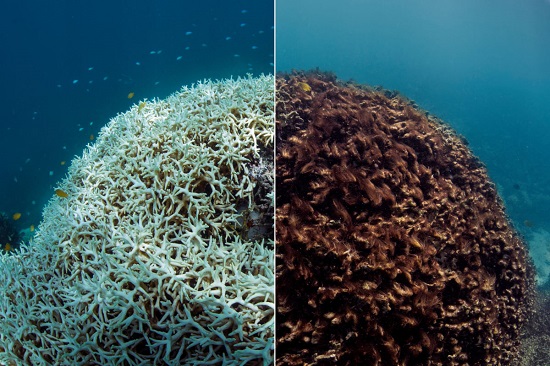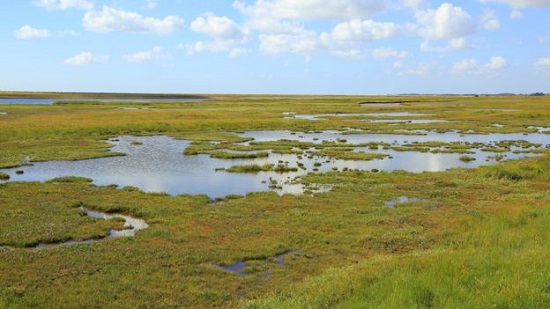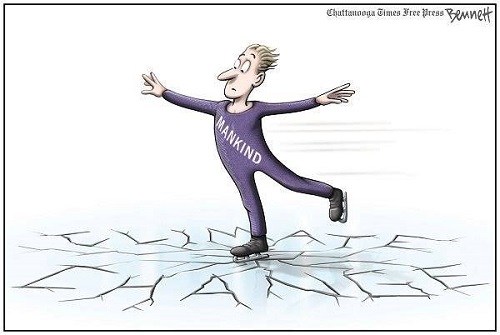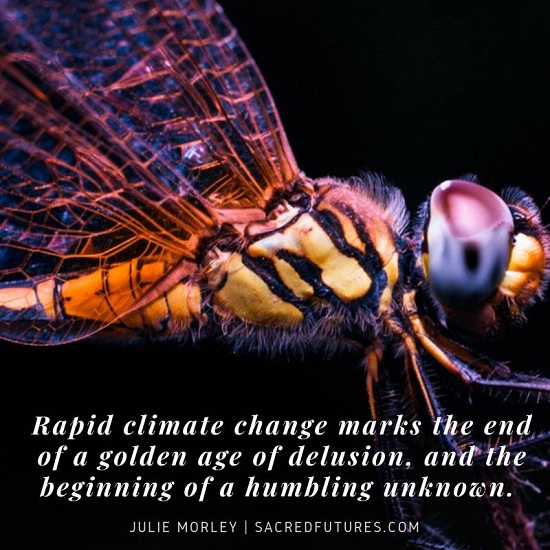2019 SkS Weekly Climate Change & Global Warming Digest #14
Posted on 7 April 2019 by John Hartz
Story of the Week... Editorial of the Week... Toon of the Week... John Cook in the News... SkS Spotlights... Coming Soon on SkS... SkS Week in Review... Poster of the Week...
Story of the Week...
How global warming is permanently reshaping the Great Barrier Reef

Bleached corals turn a ghostly white color underwater. If they can't recover quickly enough, the bleached corals die and algae coats the once-colorful surface. These images from Lizard Island, part of the Great Barrier Reef, capture the aftermath of coral mortality. Image courtesy of The Ocean Agency / XL Catlin Seaview Survey
Most thriving cities boast complex architecture — tall towers looming over narrow alleyways and plenty of nooks and crannies packed with life. Coral reefs are the cities of the undersea world, gradually constructed by the soft-bodied animals that build hard skeletons around themselves.
According to a new study in Nature, the Great Barrier Reef — the world’s largest coral system — experienced two widespread coral bleaching events in 2016 and 2017 that did more than just damage thousands of miles of corals.
The bleaching and subsequent coral death, caused by unusually warm water, also impaired the reef’s ability to replenish and repair its architecture. The study found that afterward, the number of newly born corals landing on the reefs dropped 89 percent below average historical levels.
Moreover, these recent replacement baby corals weren’t the table-shaped or big branching species that provide the most “city” architecture. Even if the reef is someday covered in coral once again, the structure itself won’t be the same, with consequences for the reef’s biodiversity.
The Great Barrier Reef has rebounded from cyclones and smaller bleaching incidents before, the researchers said. It’s made up of some 3,000 interconnected reefs, so in the past if one reef got damaged, others nearby could resupply the area with new corals. But the modern bleaching events — with their massive scale and increasing frequency — could put an end to that recovery cycle.
How global warming is permanently reshaping the Great Barrier Reef by Viky Stein, PBS News Hour, Apr 3, 2019
Editorial of the Week...
The natural world can help save us from climate catastrophe
Ecological restoration can be a powerful means of protecting the atmosphere – we need to rewild on a massive scale

Credit: Getty Images
I don’t expect much joy in writing about climate breakdown. On one side, there is grief and fear; on the other side, machines. I became an environmentalist because I love the living world, but I spend much of my life thinking about electricity, industrial processes and civil engineering. Technological change is essential, but to a natural historian it often feels cold and distancing. Today, however, I can write about something that thrills me: the most exciting field of research I have covered in years.
Most climate scientists agree that it is now too late to prevent 1.5C or more of global heating only by cutting our production of greenhouse gases. Even if we reduced our emissions to zero tomorrow, we would probably overshoot this crucial temperature limit. To prevent a full-spectrum catastrophe, we need not only to decarbonise our economy in the shortest possible time, but also to draw down carbon dioxide that has already been released.
The natural world can help save us from climate catastrophe, Opinion by George Monbiot, Comment is Free, Guardian, Apr 3, 2019
Toon of the Week...

John Cook in the News...
In her article, Climate Change Deniers Rely On These Myths, But Having A Prepared Response Can Help, (Bustle, May 3, 2019) JR Thorpe writes:
Assuming that you want to deal with the person's misinformation or skepticism and not leave the room (which you are, after all, entitled to do), there are various ways in which an argument around climate change myths can be negotiated. Australian psychologists and "debunking" experts John Cook and Stephan Lewandowsky propose a fact-based conversation that doesn't engage too much with the myths of the other side.
The embedded link is to: Neutralizing misinformation through inoculation: Exposing misleading argumentation techniques reduces their influence, Cook et al, Plos One, May 5, 2017
SkS Spotlights...

Faith Science Alliance for Climate Leadership
The purpose of this coalition of scientists and faith leaders is to advocate for public policies in Massachusetts that address the ecological and moral emergency of climate change with bold, swift, and substantive action.
Our advocacy will be grounded in principles of justice and equity because climate change disproportionately harms those least responsible for it: low-income communities, communities of color, children, and future generations.
In support of our advocacy, we seek to educate the people of Massachusetts on the urgency of the climate crisis and our shared responsibility both to reduce greenhouse gas emissions and to adapt to the changing climate.
Coming Soon on SkS...
- What will Earth look like in 2100? (Climate Adam)
- Inspiring, not depressing, film fest messages (Daisy Simmons)
- Is the grid ready for electric vehicles? (Jan Ellen Spiegel)
- Three decades of climate national defense warnings (Dana)
- New research this week (Ari)
- 2019 SkS Weekly Climate Change & Global Warming News Roundup #15 (John Hartz)
- 2019 SkS Weekly Climate Change & Global Warming Digest #15 (John Hartz)
Poster of the Week...

SkS Week in Review...
- 2019 SkS Weekly Climate Change & Global Warming News Roundup #14 by John Hartz
- New research, March 25-31, 2019 by Ari Jokimäki
- Why results from the next generation of climate models matter, Guest Post by Stephen Belcher, Olivier Boucher & Rowan Sutton (Carbon Brief)
- Protecting oil companies instead of the climate-vulnerable is elitist by Dana Nuccitelli (Bulletin of the Atomic Scientists
- Asteroid to hit Earth in August 2046 - Emergency IPCC UN panel formed by scaddenp
- 2019 SkS Weekly Climate Change & Global Warming Digest #13 by John Hartz































 Arguments
Arguments






























This meta study got published today:
Key indicators of Arctic climate change: 1971–2017
https://www.youtube.com/watch?v=asKIeN0pYTk
Also see this article at Inside Climate News on the study:
Global Warming Is Pushing Arctic Toward ‘Unprecedented State,’ Research Shows
Regarding arctic sea ice: Watch: Hundreds of walruses face plunging to death due to climate change